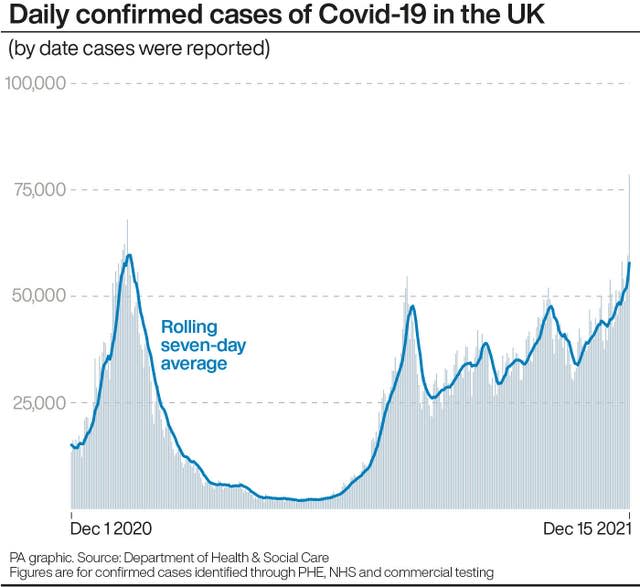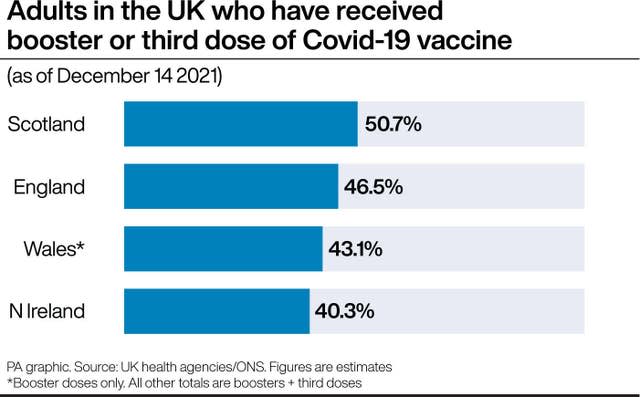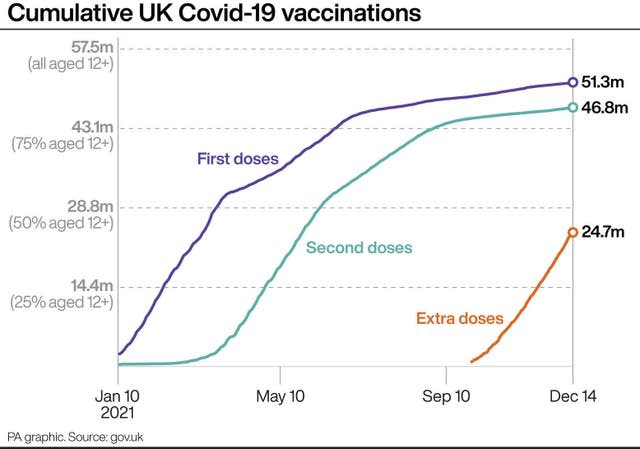UK records highest daily total of Covid cases as Omicron spreads
The UK has recorded the highest daily total of lab-confirmed coronavirus cases since the pandemic began, as the Omicron variant spreads.
Official figures published after UK Health Security Agency (UKHSA) chief executive Dr Jenny Harries warned the strain is “probably the most significant threat” since the start of the pandemic showed there had been 78,610 new cases recorded as of 9am on Wednesday.
It is the highest figure announced since mass testing began in summer last year, and surpasses the previous record of January 8 when 68,053 new cases were reported.
Health Secretary Sajid Javid declined to rule out further restrictions being introduced to tackle the surge.
Prime Minister Boris Johnson was set to hold a press conference from Downing Street later on Wednesday.
Earlier in the day, the mandatory use of coronavirus health certificates to demonstrate vaccination or a negative test for entry into large venues in England was introduced.
Compulsory mask-wearing has also been extended and work-from-home guidance was reintroduced under the Government’s Plan B to tackle the pandemic this winter.
But Mr Johnson suffered a major blow to his authority that raised questions over his ability to bring in further measures after 100 Tories rebelled to oppose the measures in a Commons vote.
Analysis suggested Omicron is now the dominant strain in London.

The UK Health Security Agency (UKHSA) said a further 4,671 cases of Omicron were recorded, bringing the total of confirmed cases in the UK to 10,017.
But the agency earlier this week estimated that the true number of daily infections from the strain first detected in South Africa is around 200,000.
Mr Javid refused to rule out the prospect of fresh measures over the coming weeks, but insisted the steps currently in place “are the right ones”.
Asked whether more guidance would be issued – rather than legislation – he told reporters at The Gordon Hospital in Westminster: “We keep the whole situation under review. It is fast-moving, I think people understand that.
“The case numbers are still sadly rising rapidly, we have been very open about how quickly this new variant spreads, we have seen it double in terms of infections every two to three days across the country.”
Asked at the vaccination centre whether restrictions could be ruled out before the new year, Mr Javid said: “We have to observe the situation and learn more about this all the time.
“We are buying time to assess this virus and build our defences.”
Pressed on whether people should prepare for new restrictions in the new year, Mr Javid replied: “You should be preparing yourselves to get boosted.”

The UKHSA’s Dr Harries warned Omicron is “probably the most significant threat we’ve had since the start of the pandemic” and said to expect a “staggering” number of cases in the next few days.
She told MPs on the Transport Committee that the “real potential risk” is whether “cases turn into severe disease, hospitalisations and deaths”, but added that it is “too early” to be clear on that.
Meanwhile, a scientist advising the Government as part of the Scientific Advisory Group for Emergencies (Sage) warned the NHS could be overwhelmed next month.
Professor Graham Medley, from the London School of Hygiene & Tropical Medicine, said though uncertainties over Omicron remain the nation “could see numbers of people being admitted to hospital getting very large” if infections continue to rise and spill into older age groups”.
Prof Medley told BBC Radio 4’s Today programme “fact that we are much more immune than we were generally means that the virus will appear to be much less severe”.
But he said the “million-dollar question” is how the wave will affect the NHS, and asked if the health service could be overwhelmed next month, he said: “I think so, there is that possibility.
“It’s very hard to be certain about these things. You certainly can’t put a risk or probability on them, but that is one of the more likely things that could happen.”

Mass testing for coronavirus was rolled out across the UK in June 2020.
Before then, only a small number of people were able to get tested, mostly in settings such as hospitals and care homes.
This means the official number of cases reported during the first wave of Covid-19 – from March to May 2020 – underestimates how many people actually had the virus, making it difficult to compare figures across the whole of the pandemic.
For example, Government data shows that cases in the first wave peaked at 6,199 on April 5, well below the peak of the second wave (68,053 on January 8), yet the number of daily Covid-19 deaths at both peaks was almost the same.
In Scotland, people have been urged to limit their mixing by socialising with only up to two other households indoors, while in Northern Ireland, politicians backed mandatory Covid certification for access to nightclubs, pubs, restaurants and other licensed premises.

 Yahoo Sport
Yahoo Sport 





































